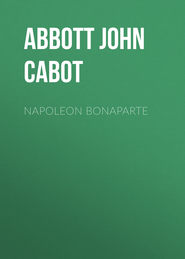По всем вопросам обращайтесь на: info@litportal.ru
(©) 2003-2024.
✖
Hortense. Makers of History Series
Настройки чтения
Размер шрифта
Высота строк
Поля
This renowned palace, with its vast saloons, its galleries of art, its garden, is one of the most attractive of residences. Napoleon was now virtually the monarch of France. Josephine was a queen, Eugene and Hortense prince and princess. Strange must have been the emotions of Josephine and her children as, encompassed with regal splendor, they took up their residence in the palace. But a few years before, Josephine, in poverty, friendlessness, and intensest anguish of heart, had led her children by the hand through those halls to visit her imprisoned husband. From one of those apartments the husband and father had been led to his trial, and to the scaffold, and now this mother enters this palace virtually a queen, and her children have opening before them the very highest positions of earthly wealth and honor.
Chapter III.
Hortense and Duroc
1799-1804
Calumnies.
It is a very unamiable trait in human nature, that many persons are more eager to believe that which is bad in the character of others than that which is good. The same voice of calumny, which has so mercilessly assailed Josephine, has also traduced Hortense. It is painful to witness the readiness with which even now the vilest slanders, devoid of all evidence, can be heaped upon a noble and virtuous woman who is in her grave.
In the days of Napoleon's power, he himself, his mother, his wife, his sisters, and his stepdaughter, Hortense, were assailed with the most envenomed accusations malice could engender. These infamous assaults, which generally originated with the British Tory press, still have lingering echoes throughout the world. There are those who seem to consider it no crime to utter the most atrocious accusations, even without a shadow of proof, against those who are not living. Well do the "Berkeley men" say:
Testimony of the Berkeley men.
"The Bonapartes, especially the women of that family, have always been too proud and haughty to degrade themselves. Even had they lacked what is technically called moral character, their virtue has been intrenched behind their ancestry, and the achievements of their own family. Nor was there at any time an instant when any one of the Bonapartes could have overstepped, by a hair's-breadth, the line of decency, without being fatally exposed. None of them pursued the noiseless tenor of their way along the vale of obscurity. They were walking in the clear sunshine, on the topmost summits of the earth, and millions of enemies were watching every step they took. The highest genius of historians, the bitterest satire of dramatists, the meanest and most malignant pen of the journalists have assailed them for half a century. We have written these words because a Republican is the only man likely to speak well of the Bonaparte family. It was, and is, and will be the dynasty of the people, standing there from 1804, a fearful antagonism against the feudal age and its souvenirs of oppression and crime."
Remarks of Napoleon at St. Helena.
Napoleon at St. Helena said: "Of all the libels and pamphlets with which the English ministers have inundated Europe, there is not one which will reach posterity. When there shall not be a trace of those libels to be found, the great monuments of utility which I have reared, and the code of laws which I have formed, will descend to the remotest ages; and future historians will avenge the wrongs done me by my contemporaries. There was a time when all crimes seemed to belong to me of right. Thus I poisoned Hoche, strangled Pichegru in his cell, I caused Kleber to be assassinated in Egypt, I blew out Desaix's brains at Marengo, I cut the throats of persons who were confined in prison, I dragged the Pope by the hair of his head, and a hundred similar abominations. And yet I have not seen one of those libels which is worthy of an answer. These are so contemptible and so absurdly false, that they do not merit any other notice than to write false, false, on every page."
It is well known, by every one acquainted with the past history of our country, that George Washington was assailed in the severest possible language of vituperation. He was charged with military inability, administrative incapacity, mental weakness, and gross personal immorality. He was denounced as a murderer, and a hoary-headed traitor. This is the doom of those in power. And thousands of men in those days believed those charges.
The voice of slander.
It is seldom possible to prove a negative. But no evidence has ever been brought forward to substantiate the rumors brought against Hortense. These vile slanderers have even gone so far as to accuse Napoleon of crimes, in reference to the daughter of Josephine and the wife of his brother, which, if true, should consign him to eternal infamy. The "Berkeley men," after making the most thorough historic investigations in writing the life both of Louis Bonaparte and Hortense, say:
"Louis was a little over twenty-three years of age at the time of his marriage. Hortense was nineteen. In his memoirs Louis treats with scorn and contempt the absurd libels respecting his domestic affairs, involving the purity of his wife's character and the legitimacy of his children. Napoleon, also, in his conversations at St. Helena, thought proper to allude to the subject, and indignantly to repel the charges which had been made against Hortense, at the same time showing the entire improbability of the stories about her and her offspring. We have found nothing, in our investigations on this subjectto justify even a suspicion against the morals or integrity of Louis or Hortense; and we here dismiss the subject with the remark that, there is more cause for sympathy with the parties to this unhappy union than of censure for their conduct."
Testimony of the Duchess of Abrantes.
Portrait of Hortense.
The Duchess of Abrantes, who was intimately acquainted with Hortense from her childhood and with the whole Bonaparte family, in her interesting memoirs writes: "Hortense de Beauharnais was fresh as a rose; and though her fair complexion was not relieved by much color, she had enough to produce that freshness and bloom which was her chief beauty. A profusion of light hair played in silky locks round her soft and penetrating blue eyes. The delicate roundness of her slender figure was set off by the elegant carriage of her head. Her feet were small and pretty, her hands very white, with pink, well-rounded nails. But what formed the chief attraction of Hortense was the grace and suavity of her manners. She was gay, gentle, amiable. She had wit which, without the smallest ill-temper, had just malice enough to be amusing. A polished education had improved her natural talents. She drew excellently, sang harmoniously, and performed admirably in comedy. In 1800 she was a charming young girl. She afterwards became one of the most amiable princesses in Europe. I have seen many, both in their own courts and in Paris, but I have never known one who had any pretensions to equal talents. Her brother loved her tenderly. The First Consul looked upon her as his child. And it is only in that country so fertile in the inventions of scandal, that so foolish an accusation could have been imagined, as that any feeling less pure than paternal affection actuated his conduct towards her. The vile calumny met the contempt it merited."
The testimony of Bourrienne upon this point is decisive. Bourrienne had been the private secretary of Napoleon, had become his enemy, and had joined the Bourbons. Upon the downfall of the Emperor he wrote a very hostile life of Napoleon, being then in the employment of the Bourbons. In those envenomed pages, Bourrienne says that he has written severely enough against Napoleon, to have his word believed when he makes any admission in his favor. He then writes:
Testimony of Bourrienne.
"Napoleon never cherished for Hortense any feeling but a real paternal tenderness. He loved her, after his marriage with her mother, as he would have loved his own child. For three years at least I was witness to all their most private actions. I declare that I never saw any thing which could furnish the least ground for suspicion or the slightest trace of culpable intimacy. This calumny must be classed with those which malice delights to take with the character of men who become celebrated; calumnies which are adopted lightly and without reflection.
"I freely declare that, did I retain the slightest doubt with regard to this odious charge, I would avow it. But it is not true. Napoleon is no more. Let his memory be accompanied only by that, be it good or bad, which really took place. Let not this complaint be made against him by the impartial historian. I must say, in conclusion, on this delicate subject, that Napoleon's principles were rigid in the extreme; and that any fault of the nature charged neither entered his mind, nor was in accordance with his morals or taste."
Notwithstanding this abundant testimony, and notwithstanding the fact that no contradictory testimony can be adduced, which any historian could be pardoned for treating with respect, there are still men to be found who will repeat those foul slanders, which ought long since to have died away.
Napoleon at the Tuileries.
Napoleon remained but two months in the palace of the Luxembourg. In the mean time the palace of the Tuileries, which had been sacked by revolutionary mobs, was re-furnished with much splendor. In February the Court of the Consuls was transferred to the Tuileries. Napoleon had so entirely eclipsed his colleagues that he alone was thought of by the Parisian populace. The royal apartments were prepared for Napoleon. The more humble apartments, in the Pavilion of Flora, were assigned to the two other consuls. The transfer from the Luxembourg was made with great pomp, in one of those brilliant parades which ever delight the eyes of the Parisians. Six thousand picked soldiers, with a gorgeous train of officers, formed his escort. Twenty thousand troops with all the concomitants of military parade, lined the streets. A throng, from city and country, which could not be numbered, gazed upon the scene. Napoleon took his seat in a magnificent carriage drawn by six beautiful white horses. The suite of rooms assigned to Josephine consisted of two large parlors furnished with regal splendor, and several adjoining private rooms. Here Hortense, a beautiful girl of about eighteen, found herself at home in the apartments of the ancient kings of France.
Beauty of Josephine.
In the evening a brilliant assembly was gathered in the saloons of Josephine. As she entered, with queenly grace, leaning upon the arm of Talleyrand, a murmur of admiration rose from the whole multitude. She wore a robe of white muslin. Her hair fell in ringlets upon her neck and shoulders, through which gleamed a necklace of priceless pearls. The festivities were protracted until a late hour in the morning. It was said that Josephine gained a social victory that evening, corresponding with that which Napoleon had gained in the pageant of the day. In these scenes Hortense shone with great brilliance. She was young, beautiful, graceful, amiable, witty, and very highly accomplished. In addition to this, she was the stepdaughter of the First Consul, who was ascending in a career of grandeur which was to terminate no one could tell where.
Malmaison.
During Napoleon's absence in Egypt Josephine had purchased the beautiful estate of Malmaison. This was their favorite home. The chateau was a very convenient, attractive, but not very spacious rural edifice, surrounded with extensive grounds, ornamented with lawns, shrubbery, and forest-trees. With the Tuileries for her city residence, Malmaison for her rural retreat, Napoleon for her father, Josephine for her mother, Eugene for her brother; with the richest endowments of person, mind, and heart, with glowing health, and surrounded by admirers, Hortense seemed now to be placed upon the very highest pinnacle of earthly happiness.
Josephine and Hortense resided at Malmaison when Napoleon made his ten months' campaign into Italy, which was terminated by the victory of Marengo. They both busily employed their time in making those improvements on the place which would create a pleasant surprise for Napoleon on his return. Here they opened a new path through the forest; here they spanned a stream with a beautiful rustic bridge; upon a gentle eminence a pavilion rose; and new parterres of flowers gladdened the eye. Every charm was thrown around the place which the genius and taste of Josephine and Hortense could suggest. At midnight, on the second of July, Napoleon returned to Paris, and immediately hastened to the arms of his wife and daughter at Malmaison. He was so pleased with its retirement and rural beauty that, forgetting the splendors of Fontainebleau and Saint Cloud, he ever after made it his favorite residence. Fortunate is the tourist who can obtain permission to saunter through those lovely walks, where the father, the wife, and the daughter, for a few brief months, walked almost daily, arm in arm, in the enjoyment of nearly all the happiness which they were destined on earth to share. The Emperor, at the close of his career, said upon his dying bed at St. Helena,
Remarkable testimony of Napoleon.
"I am indebted for all the little happiness I have enjoyed on earth to the love of Josephine."
Hortense and her mother frequently rode on horseback, both being very graceful riders, and very fond of that recreation. At moments when Napoleon could unbend from the cares of state, the family amused themselves, with such guests as were present, in the game of "prisoners" on the lawn. For several years this continued to be the favorite pastime at Malmaison. Kings and queens were often seen among the pursuers and the pursued on the green sward.
It was observed that Napoleon was always solicitous to have Josephine on his side. And whenever, in the progress of the game, she was taken prisoner, he was nervously anxious until she was rescued. Napoleon, who had almost lived upon horseback, was a poor runner, and would often, in his eagerness, fall, rolling head-long over the grass, raising shouts of laughter. Josephine and Hortense were as agile as they were graceful.
The infernal machine.
On the 24th of December, 1800, Napoleon, Josephine, and Hortense were going to the opera, to hear Haydn's Oratorio of the Creation. It was then to be performed for the first time. Napoleon, busily engaged in business, went reluctantly at the earnest solicitation of Josephine. Three gentlemen rode with Napoleon in his carriage. Josephine, with Hortense and other friends, followed in her private carriage. As the carriages were passing through the narrow street of St. Nicaire, a tremendous explosion took place, which was heard all over Paris. An infernal machine, of immense power, had been conveyed to the spot, concealed beneath a cart, which was intended, at whatever sacrifice of the lives of others, to render the assassination of the First Consul certain. Eight persons were instantly killed; more than sixty were wounded. Several buildings were nearly demolished. The windows of both carriages were dashed in, and the shattered vehicles were tossed to and fro like ships in a storm. Napoleon almost miraculously escaped unharmed. Hortense was slightly wounded by the broken glass. Still they all heroically went on to the opera, where, in view of their providential escape, they were received with thunders of applause.
The royalist conspiracy.
It was at first supposed that the Jacobins were the authors of this infamous plot. It was afterwards proved to be a conspiracy of the Royalists. Josephine, whose husband had bled beneath the slide of the guillotine, and who had narrowly escaped the axe herself, with characteristic humanity forgot the peril to which she and her friends had been exposed, in sympathy for those who were to suffer for the crime. The criminals were numerous. They were the nobles with whom Josephine had formerly lived in terms of closest intimacy. She wrote to Fouché, the Minister of Police, in behalf of these families about to be plunged into woe by the merited punishment of the conspirators. This letter reflects such light upon the character of Josephine, which character she transmitted to Hortense, that it claims insertion here.
Letter from Josephine.
"Citizen Minister,—While I yet tremble at the frightful event which has just occurred, I am disquieted and distressed through fear of the punishment necessarily to be inflicted on the guilty, who belong, it is said, to families with whom I once lived in habits of intercourse. I shall be solicited by mothers, sisters, and disconsolate wives, and my heart will be broken through my inability to obtain all the mercy for which I would plead.
"I know that the clemency of the First Consul is great; his attachment to me extreme. But the crime is too dreadful that a terrible example should not be necessary. The chief of the Government has not been alone exposed. It is that which will render him severe, inflexible. I conjure you, therefore, to do all in your power to prevent inquiries being pushed too far. Do not detect all those persons who may have been accomplices in these odious transactions. Let not France, so long overwhelmed in consternation by public executions, groan anew beneath such inflictions. It is even better to endeavor to soothe the public mind than to exasperate men by fresh terrors. In short, when the ringleaders of this nefarious attempt shall have been secured, let severity give place to pity for inferior agents, seduced, as they may have been, by dangerous falsehoods or exaggerated opinions.
"When just invested with supreme power, the First Consul, as seems to me, ought rather to gain hearts, than to be exhibited as ruling slaves. Soften by your counsels whatever may be too violent in his just resentment. Punish—alas! that you must certainly do—but pardon still more. Be also the support of those unfortunate men who, by frank avowal or repentance, shall expiate a portion of their crime.
"Having myself narrowly escaped perishing in the Revolution, you must regard as quite natural my interference on behalf of those who can be saved without involving in new danger the life of my husband, precious to me and to France. On this account do, I entreat you, make a wide distinction between the authors of the crime and those who, through weakness or fear, have consented to take part therein. As a woman, a wife, a mother, I must feel the heart-rendings of those who will apply to me. Act, citizen minister, in such a manner that the number of these may be lessened. This will spare me much grief. Never will I turn away from the supplications of misfortune. But in the present instance you can do infinitely more than I, and you will, on this account, excuse my importunity. Rely on my gratitude and esteem."
Michel Duroc.
There was a young officer about twenty-nine years of age, by the name of Michel Duroc, who was then a frequent visitor at the Tuileries and Malmaison. He was a great favorite of Napoleon, and was distinguished alike for beauty of person and gallantry upon the field of battle. Born of an ancient family, young Duroc, having received a thorough military education, attached himself, with enthusiastic devotion, to the fortunes of Napoleon. He attracted the attention of General Bonaparte during his first Italian campaign, where he was appointed one of his aides. Following Napoleon to Egypt, he gained renown in many battles, and was speedily promoted to the rank of chief of battalion, and then to general of brigade. At Jaffa he performed a deed of gallantry, which was rewarded by the applauding shouts of nearly the whole army. At Jean d'Acre he led one of the most bloody and obstinate assaults recorded in the military annals of France, where he was severely wounded by the bursting of a howitzer. At the battle of Aboukir he won great applause. Napoleon's attachment to this young officer was such, that he took him to Paris on his return from Egypt. In the eventful day of the 18th Brumaire, Duroc stood by the side of Napoleon, and rendered him eminent service. The subsequent career of this very noble young man brilliantly reflects his worth and character. Rapidly rising, he became grand marshal of the palace and Duke of Friuli.
General Duroc at Bautzen.
The memorable career of General Duroc was terminated at the battle of Bautzen, in Germany, on the 23d of May, 1813. He was struck by the last ball thrown from the batteries of the enemy. The affecting scene of his death was as follows:
Death of Duroc.
"In the early dawn of the morning of the 23d of May, Napoleon was on horseback directing the movements of his troops against the routed foe. He soon overtook the rear-guard of the enemy, which had strongly posted its batteries on an eminence to protect the retreat of the discomfited army. A brief but fierce conflict ensued, and one of Napoleon's aides was struck dead at his feet. Duroc was riding by the side of the Emperor. Napoleon turned to him and said, 'Duroc, fortune is determined to have one of us to-day.' Hour after hour the incessant battle raged, as the advance-guard of the Emperor drove before it the rear-guard of the Allies. In the afternoon, as the Emperor, with a portion of the Imperial Guard, four abreast, was passing through a ravine, enveloped in a blinding cloud of dust and smoke, a cannon-ball, glancing from a tree, killed one officer, and mortally wounded Duroc, tearing out his entrails. The tumult and obscurity were such that Napoleon did not witness the casualty. When informed of it, he seemed for a moment overwhelmed with grief, and then exclaimed, in faltering accents,
"Duroc! gracious Heaven, my presentiments never deceive me. This is a sad day, a fatal day."











